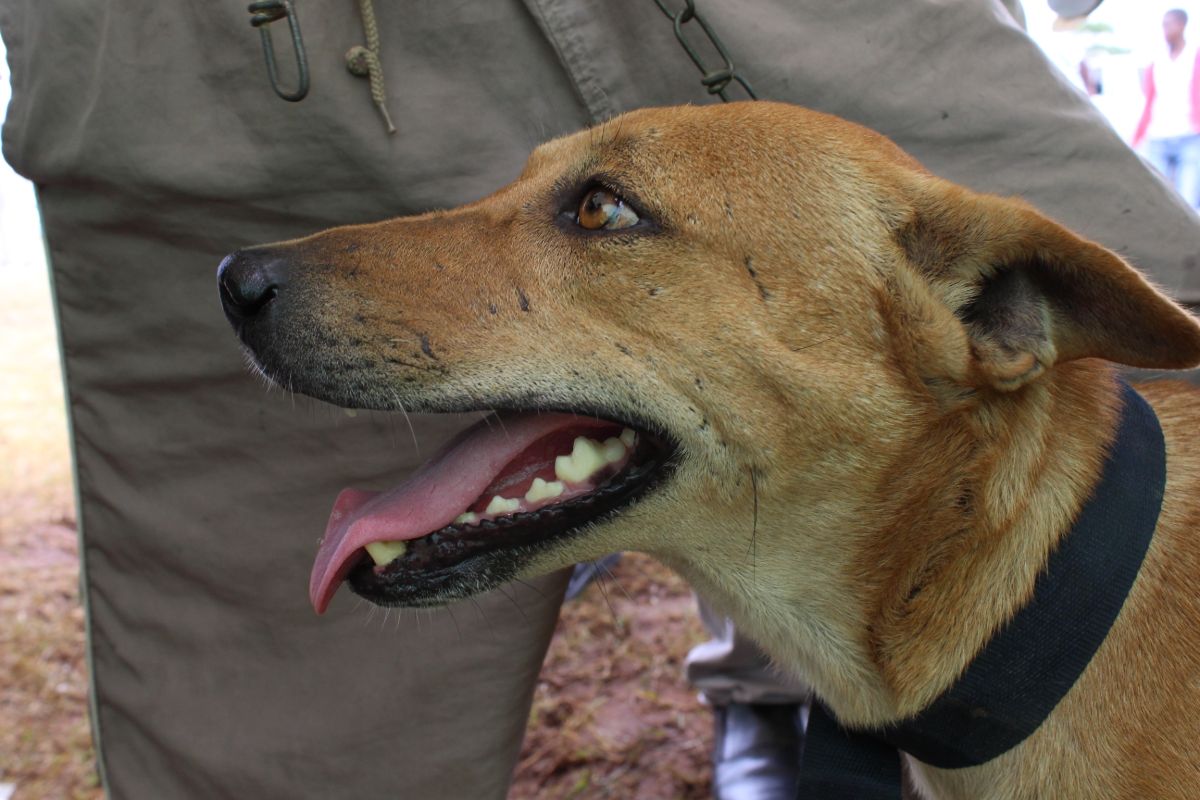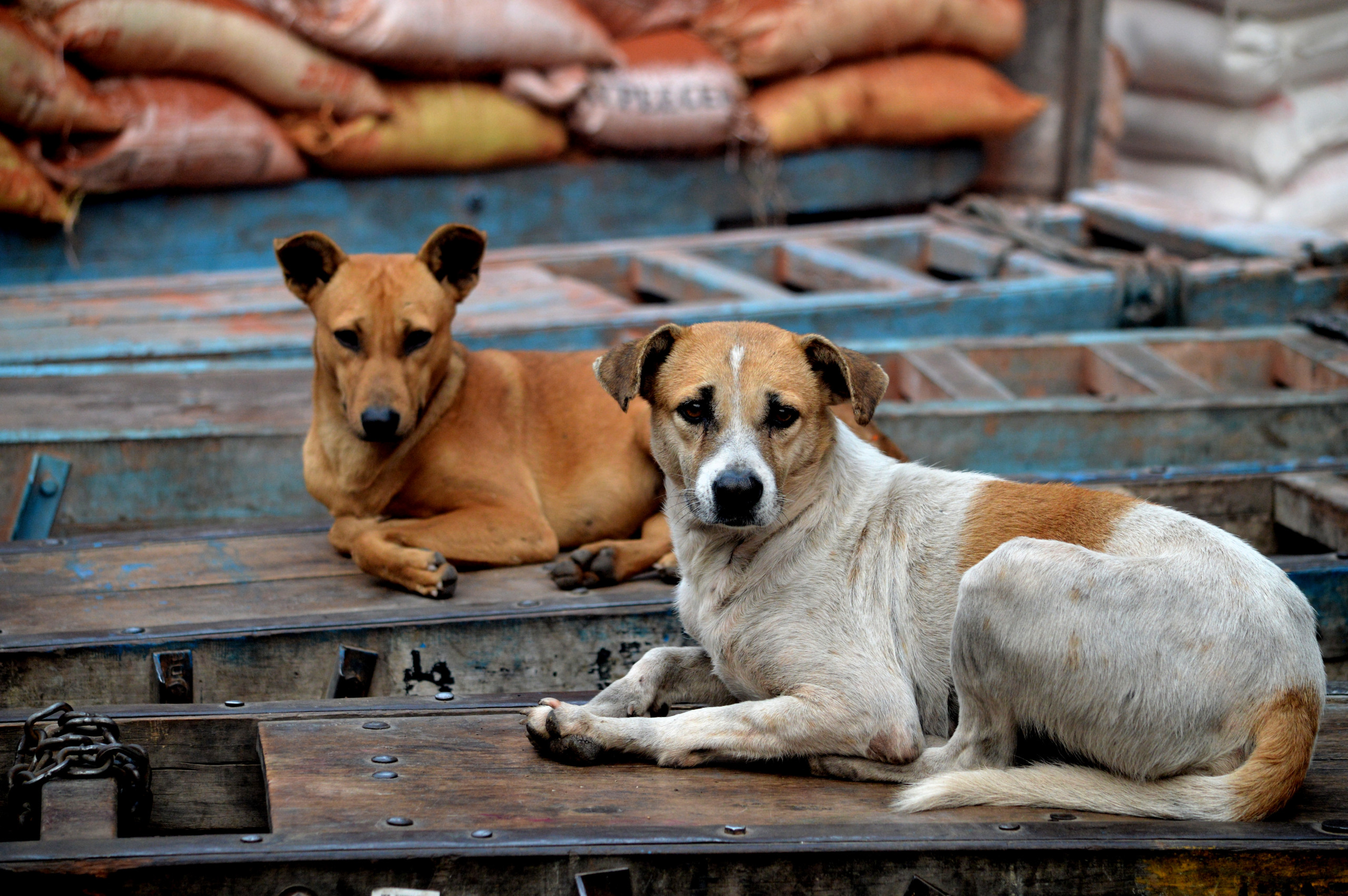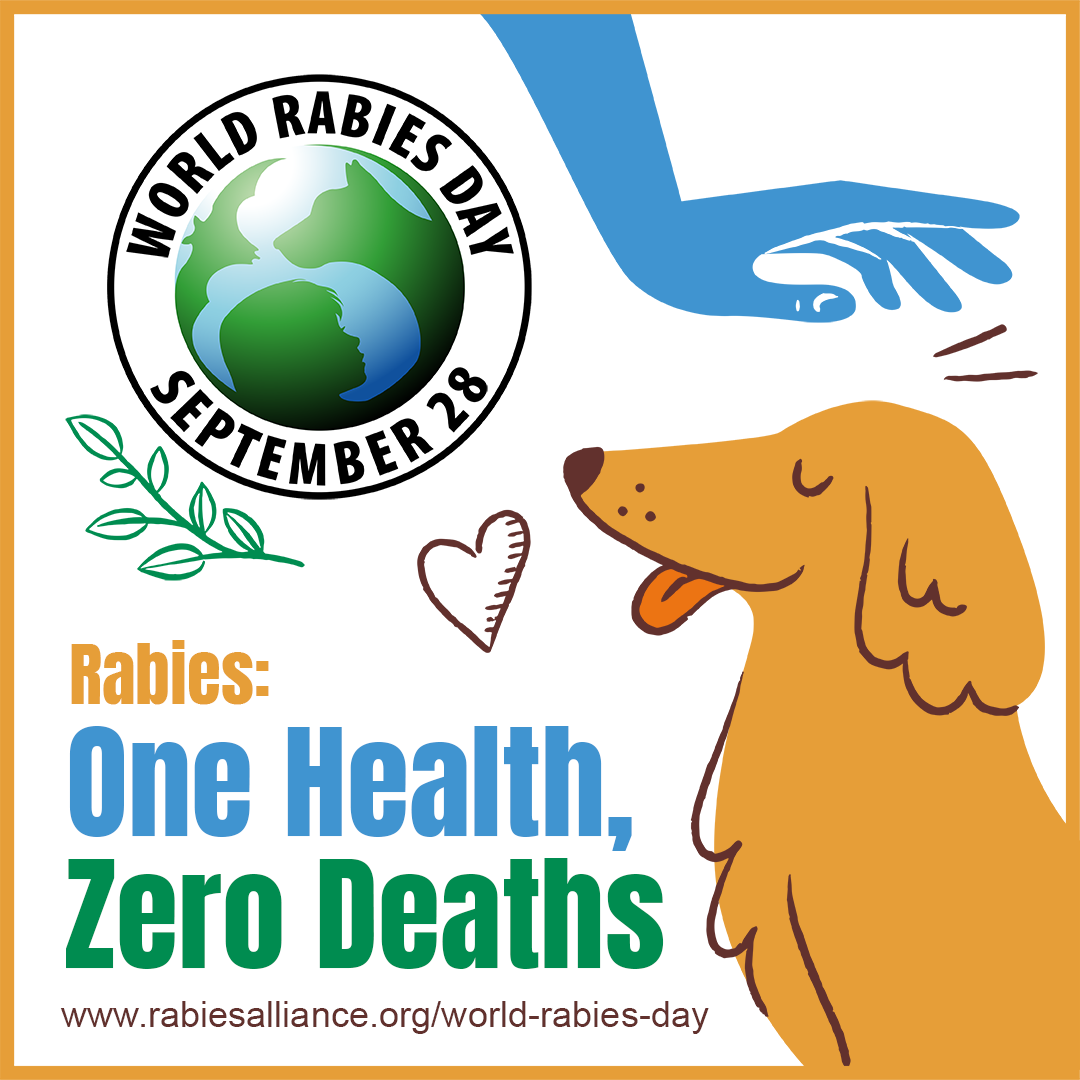
The 16th annual World Rabies Day (WRD) was commemorated on 28th September 2022. This year’s theme was “Rabies: One Health, Zero Deaths”.
In line with the theme, and in the spirit of “One Health,” the Quadripartite organizations (FAO, WHO, WOAH and UNEP), together with the Global Alliance for Rabies Control (GARC) and the African Union, jointly invited participation to the regional webinar.
Rabies is a highly fatal, yet vaccine preventable, zoonotic disease that is endemic in most African countries. In humans, rabies is almost entirely (99%) caused by bites of rabid dogs. While dog-transmitted rabies has been eliminated in Western Europe, North America, Japan, South Korea and parts of Latin America, the burden of rabies is still high in poor rural populations in Africa and Asia.
Global efforts are currently directed at elimination of human deaths from dog-mediated rabies by the year 2030. However, the threat of rabies is predicted to increase in Africa, in the absence of sustained efforts to close the gaps in access to preventive dog vaccination and post-exposure prophylaxis for affected people and animals.
This year’s webinar took stock of national efforts in rabies programmes in African countries. It also aimed to build advocacy for adoption of the “One Health” approach in implementation of the “Zero by 30: The global strategic plan to eliminate dog-mediated human rabies deaths by 2030,” across the African continent.
Broad objectives of the webinar, included:
The discussions highlighted country-level progress in rabies control. The session provided a platform for exchange of experiences, challenges and lessons learnt, in implementing One Health multisectoral approach to rabies programmes.
This objective was aimed at raising awareness of African countries to the technical tools and resources for formulation, monitoring and impact assessment of the rabies roadmap.
The importance of the One Health approach in Rabies programmes in Africa was discussed. Participation from the audience helped to identify gaps where multisectoral collaboration required to be strengthened for progressive attainment of zero human rabies deaths.
| Time | Activity | Presenter | Moderator |
| Session 1: Official opening | |||
| 10:00 – 10:10 | Welcome remarks and housekeeping | Dr. Nick Nwankpa
(AU-IBAR and PANVAC) |
African Union
Dr. Yewande Alimi (Africa CDC) |
| 10:10 – 10:40 | Welcome remarks | Prof. Louis Nel (Global Alliance for Rabies Control)
Dr. Mohammed Shamsuddin (FAO) |
|
| Dr. Richard Munang (UNEP)
Dr. Baba Ebenezer Sheshi (WHO)
Dr. Karim Tounkara (WOAH) |
|||
| Session 2: One Health in Rabies control in Africa – Country presentations | |||
| Time | Activity | Presenter | Moderator |
| 10:40 – 10:55 |
Policy and institutional frameworks |
The landscape of policies and institutional arrangements for Rabies elimination in Africa by 2030
Dr Kavosa Mudoga (Action for Protection of Animals Africa)
Preparedness of African Countries to eliminate Rabies in Africa by 2030 Dr. Judy Kimaru (Action for Protection of Animals Africa) |
African Union |
| 10:55 – 11:10 | Experiences, challenges, and lessons learnt in implementation of One Health approach in Rabies programmes | Dr. Nehemia Hedimbi (Namibia) | |
| 11:10 – 11:25 | Dr. Kallo Vessaly (Côte d’Ivoire) | ||
| 11:25 – 11:40 | Dr. Daoudongar Magloire
(Chad) |
||
| 11:40 – 11:55 | Dr. Ilham Ahamjik
(Morocco) |
||
| 11:55 – 12:10 |
Dr. Justine Kanda Assenga (Tanzania) |
||
| 12:10 – 12:25 | Question and answer | ||
| 12:25 – 12:30 | Mentimeter poll: | Major areas of success and constraint in One Health | |
| implementation of rabies programmes in your country? | |||
| 12:30 – 12:40 | Reflections on poll results (5mins) | Dr. Charles Bebay (FAO) | |
| Session 3: Tools and Resources to support One Health implementation of Rabies Elimination (Presenters from Partner Organizations) | |||
| Time | Activity | Presenter | Moderator |
| 12:40 – 12:55 | Global overview of Rabies tools and resources | Dr. Rachel Tidman (WOAH) | AU-IBAR |
| 12:55 – 13:10 | The United Against Rabies Roadmap and its role in unifying the different tools and resources | Dr. Andre Coetzer (GARC) | |
| 13:10 – 13:25 | Strengthening Prevention and Treatment |
Dr. Tieble Traore (WHO) |
|
| 13:25 – 13:40 | Rabies vaccines tested in Africa Ms. Ethel Chitsungo
(AU-PANVAC) |
||
| 13:40 – 13:55 | Laboratory diagnostics for rabies | WOAH Reference Lab network and Lab twinning for rabies diagnostics
Dr. Claude Sabeta (Onderstepoort Veterinary Institute)
Performance of animal laboratories in rabies diagnosis in selected African countries Mr Joshua Kimutai (FAO) |
|
| 13:55 – 14:10 | |||
| 14:10 – 14:25 | Question and answer | ||
| 14:25 – 14:40 | Closing remarks | Mr. Levis Kavagi (UNEP) | |
| Name | Speaker Profiles |
| Dr Kavosa Mudoga
(AU IBAR consultant) |
Dr Kavosa Mudoga is the director Action for Protection of Animals Africa, in Nairobi, Kenya where she/he is involved in Animal Welfare. More specifically, on rabies, her speciality is in Dog population Management implemented in Several countries in Africa.During the Africa Rabies Webinar on 27 th September 2022, Kavosa Mudoga will be speaking on the topic: The Landscape of Policies and institutional arrangements for Rabies Elimination in Africa by 2030.
|
| Dr. Judy Kimaru (AU-IBAR consultant) | Dr. Kimaru is a disaster risk reduction specialist, and a veterinarian has over 25 years of experience working in the UN (UNOCHA, FAO, WFP, UNDP) and NGO, and her specialty is disaster risk management, food security, and animal welfare. She has worked in Africa and Asia on programs ranging from food security and policy to ground programs.
She is a Director with Action for Protection of Animals Africa (APAA). She is currently completing her Ph.D. in Environmental Governance and Management with the University of Nairobi, adding to her expertise in environmental management for livestock food systems and her Master’s in Business Administration degree. During the Africa Rabies Webinar on 27 th September 2022, Kavosa Mudoga will be speaking on the topic: Institutional preparedness of African countries to eliminate Rabies by 2030. |
| Dr Nehemiah Hedimbi (Namibia) | Dr. Nehemia Hedimbi is the Veterinarian in the Directorate of veterinary Services, Ministry of Agriculture, Water and Land Reform, Opuwo Town, Kunene Region of Namibia. I am the National Rabies Control Programme Coordinator.
During the Africa Rabies Webinar on 27th September 2022, Nehemia Hedimbi will be speaking on the topic: Experiences, challenges and lessons learnt in implementation of One Health approach in Rabies programmes in Namibia. |
| Dr Vessaly Kallo
(Côte d’Ivoire) |
Dr. Vessaly Kallo, is a veterinarian specialized in veterinary public health, epidemiology, and the implementation of the One Health approach. He has about 20 years of professional experience in the national public administration, specifically in the Veterinary Services where he has participated and coordinated the fight against zoonoses and animal epidemics (Rabies, HPAI, Swine fever, viral hemorrhagic fevers).
Professionally, he has served as the Director of Veterinary Services of Côte d’Ivoire since August 2021. He is also the Permanent Delegate of Côte d’Ivoire to the World Organization for Animal Health (WOAH). He is the Chairman of the Animal Health Working Group of the One Health Platform in Côte d’Ivoire and the ECOWAS Expert Group for the control of Foot and Mouth Disease. Dr. Kallo, was the national coordinator of the research project on the burden of rabies in Côte d’Ivoire between 2016 and 2018. He has shared his expertise as a consultant in the field of veterinary public health for several national and international institutions such as FIRCA, FAO, WHO, EU EDES program, EcoAlliance, and USAID. He has to his credit several scientific and professional articles including two scientific articles on rabies in Côte d’Ivoire. He has also published on brucellosis, evaluation of drug residues in animal products, and biosecurity. During the Africa Rabies Webinar on 27th September 2022, Dr Vessaly Kallo will be speaking on the topic: Experiences, challenges and lessons learnt in implementation of One Health approach in Rabies programmes in Côte d’Ivoire. |
| Dr Daoudongar Magloire
(Chad) |
Dr Daoudongar Magloire is the Head of the division of regulations, legislation and sanitary control of animal movements in Chad. He has contributed to One Heath platform workshops on Development of the Good Governance Manual; Planning on the guide for the integration of health security in sectoral policies ; Food safety; National Health Security Plan and Training in field epidemiology within the framework of One Health.
During the Africa Rabies Webinar on 27th September 2022, Dr Daoudongar Magloire will be speaking on the topic: Experiences, challenges and lessons learnt in implementation of One Health approach in Rabies programmes in Chad. |
| Dr Ilham Ahamjik
(Morocco) |
Dr Ilham Ahamjik is the Head of The Epidemiology and Health Surveillance Service in The National Office of Food Safety (ONSSA), Rabat, Morocco where she is involved in developing, implementing and evaluating animal diseases surveillance and control programs. More specifically, on rabies, she coordinates the epidemiological surveillance program and participates in the development of rabies control strategy in Morocco. She is WOAH national focal point for animal disease notification.
During the Africa Rabies Webinar on 27th September 2022, Dr Ilham AHAMJIK will be speaking on the topic: Experiences, challenges and lessons learnt in implementation of One Health approach in Rabies programmes in Morocco. |
| Dr Justine Assenga
(Tanzania) |
Dr Justine Assenga has been involved in coordination of a number of rabies preparedness and response activities as a prioritization of zoonotic diseases; multisectoral response to rabies outbreak in Moshi, Malinyi and Ulanga; and rabies After Action review. He has been deeply involved in development of national rabies control strategy, and in the development of Surveillance guidelines for priority zoonotic diseases including rabies. Dr Assenga has also participated in joint risk assessment focusing on rabies and well as facilitating training of rapid response teams in Tanzania for rabies.
During the Africa Rabies Webinar on 27th September 2022, Dr. Justine A. Assenga will be speaking on the topic: Experiences, challenges and lessons learnt in implementation of One Health Approach in Rabies elimination in Tanzania |
| Dr Rachel Tidman
(WOAH)
|
Dr Rachel Tidman is the Global Rabies Coordinator, based with the World Organisation for Animal Health. Her key role is coordinating the United Against Rabies Forum, an inclusive global network of rabies stakeholders, led by FAO, WHO and WOAH. The activities of this network support the implementation of the Global Strategic Plan, Zero by 30.
During the Africa Rabies Webinar on 27th September 2022, Dr Rachel Tidman will be giving a presentation on: Global overview of Rabies tools and resources. |
| Dr Andre Coetzer
(GARC) |
Dr Andre Coetzer is the technical lead for rabies in sub-Sahara Africa for the Global Alliance for Rabies Control (GARC) where he is involved in working with different national governments and organisation in the development and implementation of their rabies elimination strategies. More specifically, Dr Coetzer focuses on supporting the implementation of strategic dog vaccination campaigns, implementing and enhancing rabies surveillance systems and providing mechanisms whereby data-driven decisions can be made in rabies-endemic countries.
Dr Coetzer has also been involved in the development of many of GARC’s tools, including the Rabies Epidemiological Bulletin, the GARC Education Platform and its specific courses, and the Stepwise Approach Towards Rabies Elimination (SARE) tool. During the Africa Rabies Webinar on 27th September 2022, Dr Andre Coetzer will be giving a presentation on: The United Against Rabies Roadmap and its role in unifying the different tools and resources. |
| Ms Ethel Chitsungo
(AU-PANVAC) |
Ms Ethel Chitsungo is a laboratory scientist with a career spanning over 25 years. She has worked in both human and veterinary settings in diagnostics, research, and teaching, and has over 13 years of working experience in an international environment. She is well versed in all disciplines of the diagnostic laboratory, with her current focus in virology, bacteriology, molecular biology, animal handling and the quality assessment of veterinary vaccines.
Ms Chitsungo is quality focussed and trained in quality management for ISO 9001 certification and ISO 17025 accreditation. She is also certified in Biorisk management. During the Africa Rabies Webinar on 27th September 2022, Ms Ethel Chitsungo will be giving a presentation on: Rabies vaccines tested in Africa. |
| Prof Claude Sabeta
(OVI) |
Prof Claude Sabeta is an Associate Professor in the University of Pretoria, Faculty of Veterinary Sciences, Department of Veterinary Tropical Diseases in Pretoria in the Republic of South Africa where he is involved in teaching veterinary microbiology and laboratory diagnostics. More specifically, Prof Sabeta is working on working on molecular epidemiology of rabies in South Africa, but also collaborating in Nigeria and the SADC.
During the Africa Rabies Webinar on 27th September 2022, Prof Claude Sabeta will be speaking on the topic: Laboratory diagnostics for rabies. |
| Mr Joshua Kimutai
(FAO) |
Mr Joshua Kimutai is the Regional Laboratory Specialist in FAO, ECTAD Eastern Africa where he is involved in veterinary laboratory capacity building, working on Laboratory Networking, Quality Assurance, Biosafety and Biosecurity activities. More specifically, on rabies, supporting laboratories in the region to enhance their rabies diagnostic capacities.
During the Africa Rabies Webinar on 27th September 2022, Joshua Kimutai will be speaking on the topic: Performance of animal laboratories in rabies diagnosis in selected African countries. |


